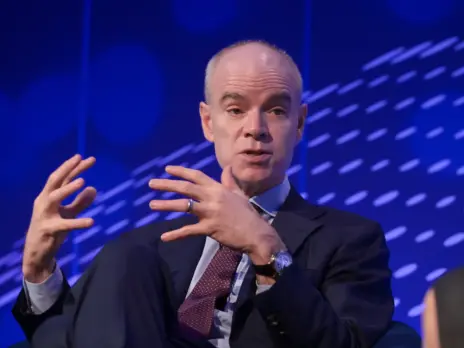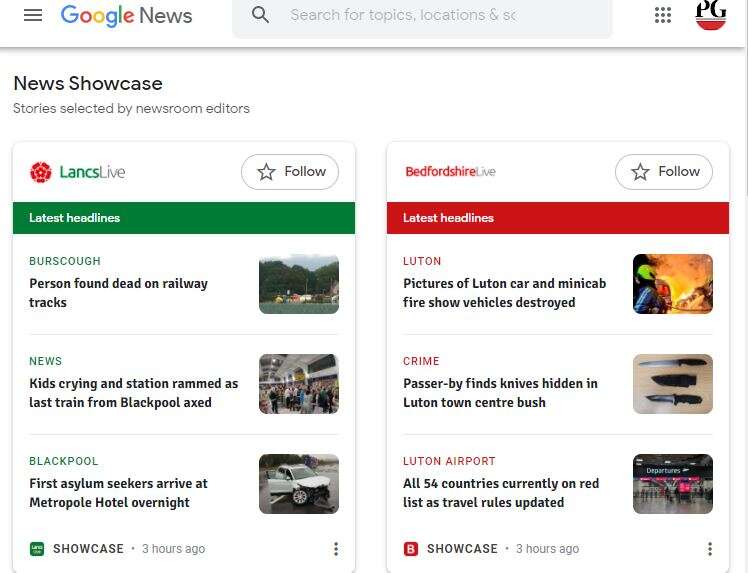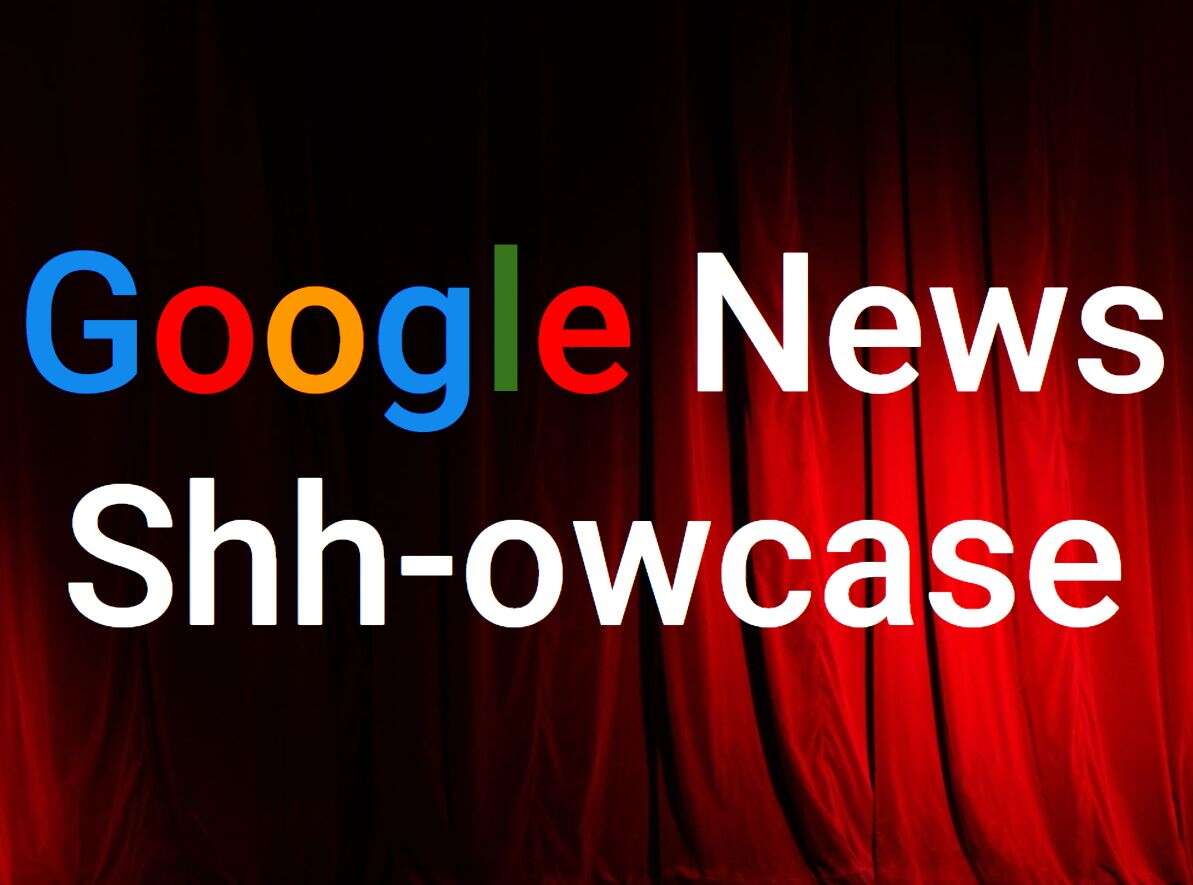
It is one year this week since Google launched News Showcase, an aggregation service with a $1bn budget to spend with the global journalism industry.
Over the past 12 months, Google has offered three-year Showcase contracts to hundreds of publishers across 15 countries. Most have accepted their payments, while a minority are holding out for more.
These multi-million-dollar deals bind together more than 1,000 individual news outlets with Google – one of the largest and most highly scrutinised companies on the planet.
And yet, in part because of strict confidentiality clauses that come attached with Google’s offers, little is known about News Showcase.
How much are publishers being paid? Why is Google paying for content that it previously indexed for free? Does anybody actually use Showcase to read the news?
Today, Press Gazette lifts the lid on Showcase and the secret deals Google has signed with news businesses across the world.
Our investigation, based on conversations with more than a dozen senior publishing industry sources across five countries, reveals:
● Details of the formula Google uses to calculate individual News Showcase payments
● The value of several individual contracts signed by publishers in different countries
● Evidence that publishers in Australia, where political pressure is highest, are receiving more favourable offers than news companies in larger countries
● Claims that Google is preparing to delay the launch of News Showcase in the US as publishers push for greater payments
● And concerns that News Showcase is not working well as a product, generating only “dribbles” of traffic for news websites.
Click here to subscribe to Press Gazette’s must-read newsletters, Future of Media and Future of Media US |
‘Nobody knows how much anybody else is being paid’
Sundar Pichai – the chief executive of Google’s owner, Alphabet – announced the launch of News Showcase in a blog on 1 October 2020.
Armed with a $333m-a-year budget, Showcase was promoted as a slick new service for readers, and a lifeline for publishers whose struggles had been exacerbated by Covid-19.
So far, Google has signed cash-for-content deals with hundreds of publishers across at least 15 countries – the US, UK, Australia, France, Germany, Italy, India, Argentina, Brazil, Canada, Japan, Czechia, Colombia, Austria and Ireland.
Showcase has launched in 11 of these countries – the UK, Australia, Germany, Italy, India, Argentina, Brazil, Japan, Czechia, Colombia and Austria.
Partners include the Telegraph and Financial Times in the UK, Le Monde in France, Der Spiegel in Germany, the Indian Express, Canada’s Globe and Mail, Reuters in several countries, and Clarin in Argentina.
Most significantly, Rupert Murdoch’s News Corp – a long-standing and vocal critic of the tech giant – has signed a deal thought by rivals to be worth around $50m a year.
Despite these high-profile deals, News Showcase remains something of a mystery to many in the global news industry.
Each Showcase contract comes with a strict confidentiality clause attached. If breached, publishers risk losing millions of dollars and damaging relations with the most important company in the media world.
The result? “Nobody knows how much anybody else is being paid,” says one executive at a major international media company.
A Google spokesperson told Press Gazette: “Google News Showcase agreements are private commercial agreements. As is standard practice with most private commercial agreements, the terms are not made public.”
With Google holding the cards, publishers are simultaneously keeping their own deals private while desperately attempting to find out what rivals are making from Showcase.
Why Google started paying for news
Under the News Showcase programme, Google pays publications a monthly fee to maintain a newsfeed, featuring headlines, pictures and website links.
Readers can browse different feeds on the Showcase homepage and choose to ‘follow’ certain publications.
Publishers with paywalled websites are also paid to offer up free access to some of their content. Publishers can choose to allow Showcase readers to access a certain number of articles for free before they are prompted to log in to their website or buy a subscription.
A Google spokesperson said: “News Showcase is a licensing program for news publishers that provides a customizable, curated space for news content in Google News and Discover. These are not payments for links, snippets, short extracts, or headlines.”
In his launch blog, Sundar Pichai presented Showcase as an extension of the Google News Initiative, a $300m fund launched in 2018 to help “build a stronger future for journalism”.
But for news industry leaders, the launch of Showcase marked an important step-change in their relationship with Google.
Press Gazette’s editor-in-chief, Dominic Ponsford, described it as “an admission that free media platforms like Google are now willing to pay for quality content”.
The news industry (including Press Gazette) had long argued that Google and Facebook – the Duopoly of the digital advertising market – should pay publishers for the use of their content.
Both companies had previously made clear this was not a precedent they were willing to set.
So what changed?
In 2020, as the advertising slowdown forced many news companies to make large cutbacks, Google and Facebook’s dominance of the market kept growing (to a combined share of 35% of all global advertising according to GroupM).
Pressure on the world’s politicians and regulators to take action was growing.
And, in the midst of the Covid-19 crisis, Australia moved first.
More than $100m dished out Down Under
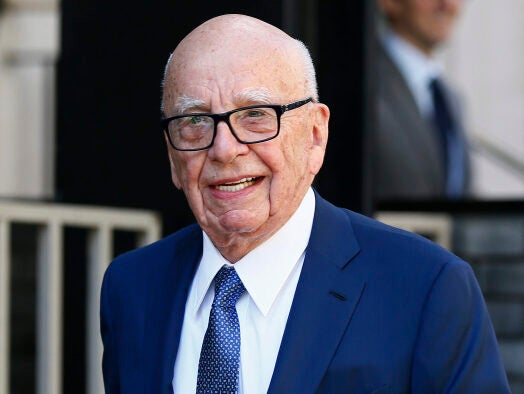
Australian media mogul Rupert Murdoch is the executive chairman of News Corp (Picture: Reuters:/Stefan Wermuth)
In April 2020, Australia’s treasurer, Josh Frydenberg, announced to the world that his government would be introducing legislation to force Google and Facebook to pay for news content.
The announcement came two-and-a-half years after the Australian government had first ordered the nation’s competition watchdog to launch an investigation into the effect digital platforms were having on journalism.
At the end of July last year, the Australian Competition and Consumer Commission (ACCC) released a draft code, which laid out how the tech giants would need to agree cash-for-content deals with publishers or face an arbitration process.
Despite noisy protestations – Google threatened to ‘leave’ Australia while Facebook briefly removed professional news from its users’ newsfeeds – Canberra pushed on.
And in February this year, as legislation became an inevitability, Google announced the imminent launch of News Showcase in Australia.
In short order, the tech giant agreed a series of eight-figure Showcase deals with the nation’s largest and most influential publishers – News Corp, Seven West, Nine and ABC.
These agreements meant that Google could avoid being forced into an arbitration process with the publishers once the law was passed.
According to Australian news reports, and industry sources spoken to by Press Gazette, Seven West and Nine are both thought to have signed annual deals with Google worth AU$30m ($22m/£16m). ABC, Australia’s publicly-owned broadcaster, is reported to have agreed a deal worth AU$25m ($18m/£13m) per year.
The size of News Corp’s deal – incorporating its titles across the US, UK and Australia – has not been reported. But the market rumour, and the working assumption of two rival international publishers spoken to by Press Gazette, is that News Corp’s Google deal is worth around $50m (AU$69m/£37m) annually.
According to market sources, Guardian Australia signed up to News Showcase after being offered around AU$5m ($3.6m/£2.7m) a year by Google. According to one well-informed source, the Daily Mail Australia is understood to have rejected an offer worth about a third of this amount.
Others to have signed up Down Under include Yahoo Australia, Business Insider Australia and Conversation Australia.
Country Press Australia, a group representing hundreds of local news publications, agreed a deal for its members this month after being given collective bargaining rights by the ACCC.
How does Google decide which publications should be included in the scheme?
“News Showcase is focused on comprehensive general interest news and the primary intent is to create strong relationships between Google users and news publishers,” said a company spokesperson.
“The inclusion process considers objective criteria including: association memberships, publisher traffic, circulation data, government certifications, and more.”
The News Showcase ‘formula’
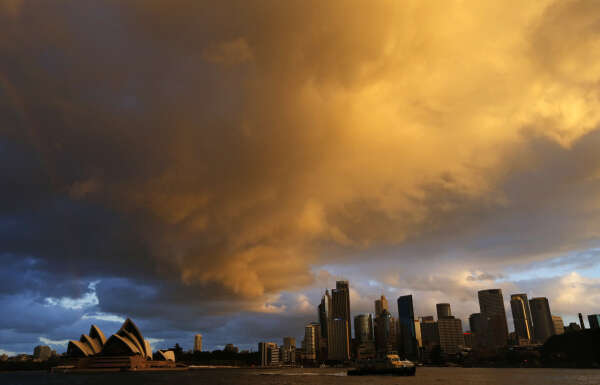
Publishers in Australia are thought to have received more generous Showcase deals than rivals overseas (Reuters/Daniel Munoz)
It might be assumed that the eight-figure deals leaking out of Australia are good news for the rest of the global journalism industry.
After all, Google is understood to have told numerous publishers that their Showcase offers are non-negotiable and dictated by a strict, globally consistent formula that is likely to be scrutinised by regulators.
But Press Gazette’s investigation suggests publishers in Australia are being offered better deals than their peers elsewhere.
One well-informed source estimated that Google’s budget for Australian deals is three times greater than its equivalent budget for the UK news industry. This is despite the fact that the UK economy is twice the size of the Australian economy. The source suggested Google may be willing to pay more money to Australian publishers because of pressure from Canberra.
One international publisher told Press Gazette that their Australian arm had been offered more Showcase money than their much larger main edition.
Many of our publishing industry sources said Google has failed to properly explain the Showcase formula.
“They don’t explain the figures,” said one senior source at a large international publisher that rejected its offer. “They just say: ‘Here is a figure.’”
“They make it up as they go along,” said the boss of a British local news publishing company that did sign up to be a Showcase partner. “They pay you whatever they think they can get away with. There is no proportionality, and that is going to lead to a great deal of unhappiness.”
A source at another international publisher, which has signed a Showcase deal, described the formula as “relatively opaque”.
It appears that some large publishers have been given more in-depth briefings on the formula.
Several sources agreed that it encompasses audience size, volume of content, subscription prices where applicable and journalist employment costs.
A Google spokesperson said: “News Showcase payments cover the publisher’s editorial curation of stories for News Showcase panels and, in some cases, beyond-the-paywall access to a set number of articles for Google users, as well as a license for text and other assets needed to run the News Showcase product.
“We take into account objective metrics including publisher traffic, the amount of content being provided, and the cost of providing limited free access to content behind paywalls for users.”
Google’s Showcase add-ons
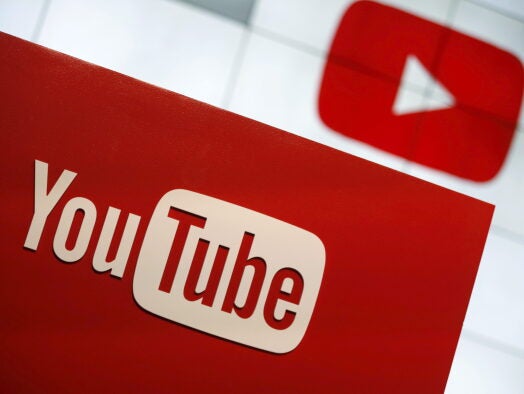
News Corp’s Google deal included funds for “the cultivation of audio journalism and meaningful investments in innovative video journalism by YouTube” (Reuters/Lucy Nicholson)
Assuming there is a strict, “inflexible” formula at the heart of Showcase, why do Australian publishers appear to be receiving disproportionately generous deals?
The primary reason appears to be that News Showcase deals often come with add-ons.
For example, when News Corp announced its cash-for-content deal with Google, the News Showcase scheme was the focus of its press release and media coverage.
But, as disclosed by News Corp, the agreement also included funds for “the development of a subscription platform, the sharing of ad revenue via Google’s ad technology services, the cultivation of audio journalism and meaningful investments in innovative video journalism by YouTube,” the video platform that is owned by Google.
In other cases, Google is understood to have made advertising commitments with publishers in addition to News Showcase deals.
One senior source at an international publisher that declined to become a News Showcase partner claimed that rivals had been offered extra payments in exchange for their use of Google products like Gmail and other office tools.
These deals are technically separate from Showcase. But many of our sources viewed them as being attached to Showcase. Most of the payment figures in this article incorporate News Showcase and related payments.
A Google spokesperson said: “News Showcase deals are offered independently of other commercial considerations.”
Critics say that these add-ons enable Google to top up Showcase payments for publishers with greater political clout.
Other sources argued that Google, as a private company, should be free to make investments where it sees fit. They added that it makes sense for Google to make investments that enhance its brands by associating them with large, trusted media outlets.
Publishing sources have also identified ways in which the News Showcase payment can be manipulated.
For example, one local news publishing source complained that Google had chosen to include only a small proportion of their publications in Showcase, thereby bringing down the company’s total payment.
Other sources said the nature of the formula allows Google to “weight” variables differently by country.
Asked to comment on the apparent discrepancy between payments to publishers in Australia versus other countries, a Google spokesperson said: “Just as the news market differs from country to country, the size and scope of our efforts will reflect those differences. The deals are commensurate with the market, as well as the individual situation of each publisher.”
They added that Google “uses a consistent formula from market to market for News Showcase but news markets are not the same globally, nor is publisher participation the same in every country. Like any commercial deal, News Showcase agreements cover the things that we and the partner publishers agree upon.”
UK: ‘Many publishers have done a deal in the UK – but most are unhappy’
In spite of numerous concerns and gripes, several large publishers have signed up to become Google News Showcase partners, while a minority have held off from doing so.
Why have news companies gone down different paths? The answer varies by country and publisher.
One source at a UK publication that has not signed up to News Showcase said many British publishers have accepted offers simply because they need the money at a tough time for the industry.
“Many publishers have done a deal in the UK – but most are unhappy,” said a source at another British news organisation.
In the UK, Showcase partners include the Financial Times, Reuters, the Independent and Evening Standard, as well as News Corp’s Times, Sun and Financial News. Also signed up are regional publishers including Reach, Archant, Iliffe Media, Gannett-owned Newsquest and JPI Media.
Press Gazette’s sister publication, the New Statesman, is also a Showcase partner. And, in the interests of full disclosure, it should be noted that Google is also a sponsor of the Press Gazette-run British Journalism Awards.
JPI, which publishes titles including The Scotsman and the Yorkshire Post, has disclosed to investors that it earns £100,000 a month, or £1.2m a year, from deals with Google and Facebook.
An industry source estimated that JPI’s Showcase deal would account for about two-thirds of this total, or around £800,000 a year.
Another UK industry source said that, according to market rumour, Reach – the UK’s largest regional newspaper owner and the publisher of national titles including the Mirror – is being paid between £1-1.5m a year by Google.
The working estimation of one British newsgroup is that Google has set aside a budget of around £30m a year for News Showcase and related payments in the UK.
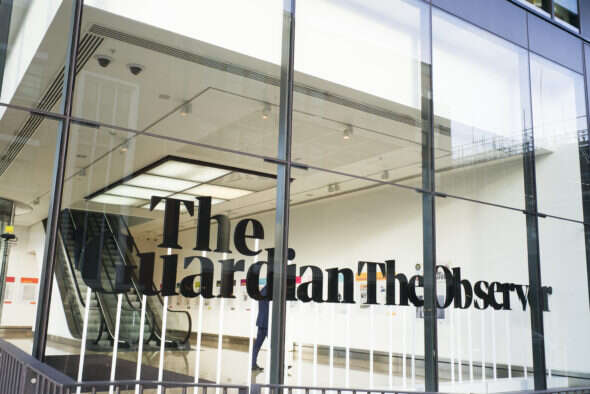
The Guardian is not currently a News Showcase partner in the UK (Picture: Graeme Robertson)
Two noteworthy publishing industry absentees from News Showcase in the UK are the Guardian and DMGT, which publishes the Daily Mail, Mail on Sunday, Mail Online, Metro and the i.
The Guardian’s absence appears particularly significant because its Australian edition is a News Showcase partner.
Robert Hahn, director of business affairs and platform partnerships at the Guardian, told Press Gazette’s tech series that the News Showcase money had “offered a material change in terms of our revenue mix” for its Australian operation.
Matt Rogerson, Guardian Media Group’s director of public policy, told a House of Lords select committee in March: “In Australia, the payments now coming from Google to publishers are meaningful and significantly higher than the payments that they would otherwise make in the UK, where there is not a mandatory code in place.”
DMGT is a long-established foe of Google.
Earlier this year, the publisher launched an anti-monopoly US lawsuit against Google. One source said that Google’s News Showcase contracts contain clauses that would prohibit DMGT from pursuing such a lawsuit.
DMGT is believed to have rejected News Showcase offers in the UK and Australia.
A spokesman for the UK’s News Media Association said that British publishers “tend to view the deals they’ve reached as (welcome) short-term additions but not game-changing in terms of sustainability.
“The overriding principle of payment for content is of course a very important one and getting to the right regulatory/legislative ecosystem in which publishers are fairly rewarded for the content they invest in is a key focus for NMA.
“Publishers in Australia are reporting more meaningful deals because the government there has legislated to bring in the news media bargaining code to ensure the platforms play fair in terms of paying for content.”
If you have information that you would like to share about Google News Showcase, Facebook News, Apple News or any other platform partnership, please email in confidence william.turvill@pressgazette.co.uk.
EU regulations hit Google in France and Germany
Google has agreed deals with several large publishers in France and Germany, the European Union’s largest economies.
But regulatory setbacks, stemming from the EU’s new Copyright Directive, have created complications for Google.
As first reported by Reuters and verified by a well-placed source, Google agreed a $76m cash-for-content deal with 121 French news publishers – represented by the Alliance de la presse d’information generale (APIG) – in January this year.
The Reuters report stated that publishers were being paid $22m annually for licensing deals and an extra $10m in exchange for not suing Google over copyright for three years.
The agreement included a commitment to participate in News Showcase but it is not clear how much this part of the deal was worth.
According to one well-placed source, the smallest publications will be paid at least €8,000 per year under the deal, while France’s largest titles would receive in excess of €1m a year.
Reuters also reported in February that three national titles – Le Monde, Le Figaro, and Liberation – had agreed deals under which they would be paid about €3m a year each on top of their other €1m-plus deals.
The situation was complicated in July when France’s competition regulator, the Autorité de la Concurrence, imposed a €500m fine on Google for failing to negotiate content deals with publishers “in good faith”. Google has appealed against the fine.
The Autorité de la Concurrence specifically criticised the tech company for framing the negotiations around News Showcase.
A Google spokesperson told Press Gazette: “While we are committed to complying with the Copyright Directive and the [French Competition Authority’s] orders, this fine ignores the significant efforts we have made to reach agreements and the reality of how news works on our platforms.
“Google last year generated less than €6m in revenue (not-profit) from clicks on ads on possible news-related queries in France. We want to find a solution and reach definitive agreements but this fine is out of all proportion to the amount of money we make from news and we have appealed.”
Google is caught in a similar predicament in Germany, despite the fact Showcase was launched there on 1 October 2020.
In June, Germany’s competition authority, the Bundeskartellamt, commenced an investigation into Google News Showcase.
The authority said it was seeking to ensure Showcase “will not result in discrimination between individual publishers”.
In Germany, deals have been agreed with several publishers and publications, including Der Spiegel, Berliner Verlag, Burda and Handelsblatt Media Group.
A well-placed market source estimated that the nation’s largest publications have agreed deals worth €1-4m a year, roughly in line with figures from France.
Notably, Axel Springer – the international publishing giant that owns Insider in the US and recently acquired Politico – has not signed up its German publications, which include Bild and Die Welt.
It is understood that Axel Springer does not want to tie itself to News Showcase terms before the EU’s copyright laws take effect in Germany.
A company spokesperson told Press Gazette: “We have always said that Axel Springer is open to examining a cooperation with e.g. Google, but only to the extent that it does not make it difficult or impossible to effectively exercise the Publisher’s Right.
“At this point in time, we are observing among some platforms that they are increasingly willing to acknowledge the importance that content from publishers has for their products.
“We are confident that this development will continue. And with that, collaborations with platforms are then conceivable in principle.”
US: Showcase delay on the cards
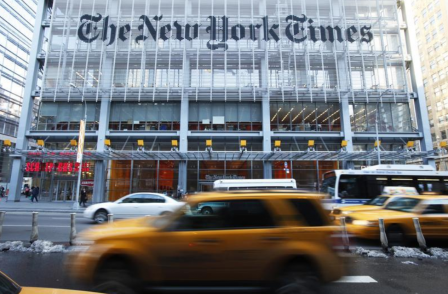
The New York Times is one of several large US publishers that Google wants to sign up to News Showcase (Reuters/Lucas Jackson)
For Google, the most concerning gap in its News Showcase empire is probably the United States, which is home to its own headquarters as well as some of the world’s largest publications.
The tech giant has already struck global deals with News Corp – which publishes the Wall Street Journal, New York Post and Barron’s in the US – and Reuters.
But no agreements with major titles and publishers like the New York Times, Washington Post, Los Angeles Times and Gannett have yet been announced.
One well-informed US news industry source suggested that Google is likely to have offered the nation’s largest publishers, like the New York Times and the Washington Post, in excess of $10m a year.
US news industry sources tell Press Gazette that Google was aiming to launch News Showcase in its home market during this quarter. Two senior sources we spoke to now speculate that the launch will be delayed into next year.
Talks with some large publishers are understood to have begun months ago, and at least some firm offers have been made. But no deals have been announced.
Some smaller publications are understood to have been sounded out by Google but have not received offers at this stage.
Why the hold up?
“The biggest publishers in the US are the most attractive to Google, but also the biggest pain in the ass,” offered one senior industry source.
David Chavern, chief executive of the News Media Alliance (NMA), told Press Gazette: “We don’t know much about Google’s initial offers, but we did hear that they were insufficient to cause anyone to immediately jump to ‘yes’.”
Chavern and the NMA are lobbying for Washington to pass the Journalism Competition and Preservation Act, which would allow US publications to collectively negotiate cash-for-content deals with Google and other tech platforms.
Asked about the apparent delay to Showcase’s US launch, a Google spokesperson said: “We are on course with our overall plan for News Showcase and its roll-out across the US and the rest of the world. We’ve already brought News Showcase to a dozen countries and we’re speaking to a number of publishers in the US and around the world and are happy with how things are progressing.”
Publishers underwhelmed by payments and product
What is the point of Google News Showcase? This question formed a key part of Press Gazette’s investigation.
Google says Showcase is a product designed to help its users find and access quality, trustworthy news.
But critics, like US journalism academic Jeff Jarvis, say it is an “envelope stuffed with cash” designed to placate publishers and stave off regulation across the world.
Either way, Press Gazette’s investigation suggests Showcase is falling short of expectations.
Sources at three Showcase partner publishers, covering the UK and Australia, reported receiving minimal traffic from the aggregation site.
One spoke of “dribbles of traffic” and another revealed they had received fewer than 100 clicks over the course of a month.
The third source said their company, which viewed Showcase as a genuine opportunity for growth, had experienced “very frustrating bugs” behind the scenes. “We’re getting the sense that Google feels like: ‘Well, we’re paying you, so what do you care?’”
A Google spokesperson said: “Like all new products, News Showcase’s success for publishers will ultimately be judged over a longer horizon, which is normal in product development.
“The value of News Showcase is about driving high-value traffic directly to the publisher, increasing engagement with users, and helping develop a deeper relationship with readers.”
They claimed that, as of May, users had clicked the ‘follow’ button on Showcase more than 460,000 times and that “we’re seeing 10 million+ clicks per month on News Showcase panels”.
They added: “The tool is continually evolving based on both publisher feedback and internal product innovation. Any reported bugs are investigated in a timely manner, and publishers are provided with a highly reliable interface within which to craft and publish their custom News Showcase panels.”
On the money side, few of Press Gazette’s industry sources were fully satisfied with their Showcase and related payments.
“It doesn’t really feel like they’re trying to pay us off, to be honest,” said a source at one major US publishing company. “These are not payoff sums, in my view.”
A Google spokesperson described Showcase as “a long-term commitment from Google that brings together a robust licensing program along with a new news experience that enables publishers to curate and deepen relationships with readers and turn them into loyal customers.
“The feedback and uptake we have had from publishers has shown us that this is an approach that they like and that has a long-term future.”
But will Google News Showcase, in its current form, really be enough to keep publishers happy and ward off demands for Australia-style regulation across the world?
Our investigation suggests not.
If you have information that you would like to share about Google News Showcase, Facebook News, Apple News or any other platform partnership, please email in confidence william.turvill@pressgazette.co.uk.
Google’s response in full
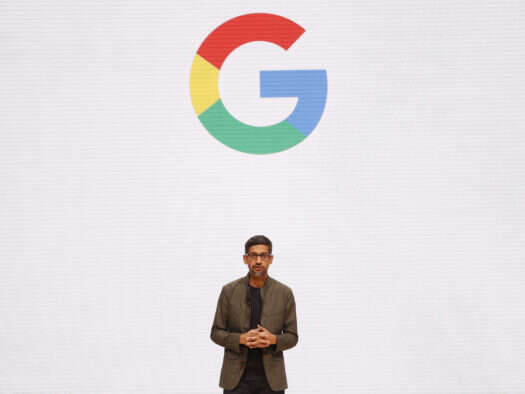
Alphabet/ Google chief executive Sundar Pichai (Picture: Reuters)
Press Gazette: Some critics, e.g. Jeff Jarvis, argue that Showcase is a form of bribery designed by Google to keep publishers happy and stave off regulation. Can you comment on this suggestion?
Google spokesperson: “Journalism and the news industry are fundamental to society. Google is committed to playing its part to help news publishers succeed. We’ve heard the feedback from both publishers and policymakers that we all can do more to enable a better future for news and we have said we’d continue to develop ideas to further support the news industry. With News Showcase, other products like Subscribe with Google, and all of our efforts under the Google News Initiative, we are following through on that commitment.
“News Showcase is a long-term commitment from Google that brings together a robust licensing program along with a new news experience that enables publishers to curate and deepen relationships with readers and turn them into loyal customers. The feedback and uptake we have had from publishers has shown us that this is an approach that they like and that has a long-term future.”
PG: Assuming this is not the purpose, can you say what the purpose of Showcase is? Why does Google pay to index headlines and links that it already carried for free on Google News?
Google: “News Showcase is a licensing program for news publishers that provides a customizable, curated space for news content in Google News and Discover. These are not payments for links, snippets, short extracts, or headlines. News Showcase empowers publishers to better curate their content on these surfaces, tell stories in a meaningful way and enable people to engage directly with the publisher’s brand to support deeper relationships with readers and help turn them into loyal customers for the publisher.”
PG: Can you tell us about the governance around Showcase? E.g. Who decides which publishers should be offered deals and which shouldn’t? How can publishers not involved in the scheme currently apply to become a partner? Google:
Google: “The inclusion process for News Showcase is built to account for news publisher and user differences by country and region. News Showcase is focused on comprehensive general interest news and the primary intent is to create strong relationships between Google users and news publishers. The inclusion process considers objective criteria including: association memberships, publisher traffic, circulation data, government certifications, and more. Participating publishers curate daily collections of articles. While not all publications are set up to provide the deliverables needed for News Showcase, we do have well-established products that publishers can leverage that provide value and help contribute to a publisher’s sustainability. These products deliver substantial benefits via traffic (24bn clicks a month for free globally), ad revenue share via our ad network products and the Google News Initiative which comes with a $300m investment to help journalism thrive in a digital age. Read more here.”
PG: Several publishing industry sources we spoke to were concerned about a lack of transparency around Showcase, both for themselves and for the public. They said that, because Showcase deals come with confidentiality terms attached, there is no way for anyone to know how much news publishers are being paid by Google. Can you comment on this?
Google: “Google News Showcase agreements are private commercial agreements. As is standard practice with most private commercial agreements, the terms are not made public. News Showcase is part of our recent $1bn investment in global news partnerships, announced last year and represents Google’s single biggest investment in news partnerships.
“News Showcase is just one way that we support news publishers. The Google News Initiative was launched in 2018 with a $300m investment to help journalism thrive in a digital age. We’ve also provided nearly $40m in emergency funding to around 5,000 publishers in the past year, have committed $100m in marketing spend with news publishers, and launched a $15 million Support Local News Campaign in the US and Canada last year to provide immediate relief in the wake of Covid.”
PG: Several sources we spoke to said they had experienced minimal traffic from News Showcase (in some cases, fewer than 100 clicks over a whole month) and that there are bugs associated with the tool. Can you comment on this and tell me how Google plans to improve the service?
Google: “Like all new products, News Showcase’s success for publishers will ultimately be judged over a longer horizon, which is normal in product development. The value of News Showcase is about driving high-value traffic directly to the publisher, increasing engagement with users, and helping develop a deeper relationship with readers. Part of this program includes Google paying for paywalled content to provide limited free access to content for interested users so that publishers turn those readers into loyal subscribers. In May, we reported that users tapped the Follow button on News Showcase panels more than 460,000 times and we’re seeing 10 million+ clicks per month on News Showcase panels. The tool is continually evolving based on both publisher feedback and internal product innovation. Any reported bugs are investigated in a timely manner, and publishers are provided with a highly reliable interface within which to craft and publish their custom News Showcase panels.”
PG: Can you explain to me how News Showcase payments are calculated? Most publishers I spoke to said Google has a global formula – that includes audience size, content levels, subscription prices where applicable, and journalism employment costs – but several said this formula is opaque and not fully explained. Can you explain and comment on this?
Google: “News Showcase payments cover the publisher’s editorial curation of stories for News Showcase panels and, in some cases, beyond-the-paywall access to a set number of articles for Google users, as well as a license for text and other assets needed to run the News Showcase product. We take into account objective metrics including publisher traffic, the amount of content being provided, and the cost of providing limited free access to content behind paywalls for users.”
PG: Despite this strict formula, our research suggests that deal sizes are not consistent between countries. E.g. Several of our sources believe that Australian publishers are getting more favourable deals because of greater political and regulatory pressure. We heard from one international publisher (cannot name) that their Australian edition had received a greater offer than larger offer than its main edition in another country. Can you comment on this?
Google: “Just as the news market differs from country to country, the size and scope of our efforts will reflect those differences. The deals are commensurate with the market, as well as the individual situation of each publisher.”
PG: Our sources say that Showcase deals can be manipulated around the formula, e.g. by not including all of a publisher’s titles or by weighting countries differently. Can you comment on this?
Google: “Google uses a consistent formula from market to market for News Showcase but news markets are not the same globally, nor is publisher participation the same in every country. Like any commercial deal, News Showcase agreements cover the things that we and the partner publishers agree upon.”
PG: Our sources also say that News Showcase deals can also be topped up using other attachments, e.g. ad commitments, audio and video journalism investments and payments to use Google office tools like Gmail. Several of our sources were concerned that this enables Google to favour certain publishers. Can you comment on this?
Google: “News Showcase deals are offered independently of other commercial considerations.”
PG: Market sources believe that Australian deal figures are as follows: News Corp (inc. US and UK) $50m a year, Seven West AU$30m, Nine AU$30m, ABC AU$25m. Can you comment on these figures?
Google: “Like most companies, we don’t publicly disclose or discuss the details of private commercial deals we’ve done in any market.”
PG: For the UK, we’ll be reporting that many large publishers have signed deals because they need the money but that most want greater regulation in the UK to ensure greater payments in the future. Can you comment?
Google: “Google has a track record of working closely with the news industry for the last 20 years and delivering value either through our products, services, ad revenue share or direct funding. We are one of the biggest financial supporters of journalism in the world and remain committed to playing our part to support quality journalism. The future of the industry is something that requires a shared responsibility and for others to also step up.”
PG: For France, we’ll be noting the details of Reuters’ $76m deal report and mentioning the €500m fine. Can you comment?
Google: “While we are committed to complying with the Copyright Directive and the FCA’s orders, this fine ignores the significant efforts we have made to reach agreements and the reality of how news works on our platforms. Google last year generated less than 6 million Euros in revenue (not-profit) from clicks on ads on possible news-related queries in France. We want to find a solution and reach definitive agreements but this fine is out of all proportion to the amount of money we make from news and we have appealed.”
PG: For Germany, we’ll be noting that the country’s biggest publisher, Axel Springer, has not signed up and is holding out for more through the EU Copyright Directive. Can you comment?
Google: “You should probably speak to Axel Springer about that. We have spoken to them a number of times and over the years engaged on various products and programs. More than 80 publications are signed up for News Showcase in Germany and you can find details on our compliance with the Copyright Directive here.”
PG: For the US, our sources say that Showcase was due to launch in Q4 2020 but that this now looks likely to be delayed, probably because Google is struggling to sign up large publishers. Can you comment?
Google: “We are on course with our overall plan for News Showcase and its roll out across the US and the rest of the world. We’ve already brought News Showcase to a dozen countries and we’re speaking to a number of publishers in the US and around the world and are happy with how things are progressing. Of the over-1,000 publications we have signed globally to date, nearly 90% are local or regional in nature.”
Top photo credit: Shutterstock
This article was edited on 5 October to state that Showcase deals have been agreed in at least 15, rather than 16, countries and that it has launched in 11 rather than 12 of them. Previously Italy was named twice in these lists. We also clarified that Google is rumoured to have set aside £30m per year for the UK news industry rather than £30m over three years.
Email pged@pressgazette.co.uk to point out mistakes, provide story tips or send in a letter for publication on our "Letters Page" blog

